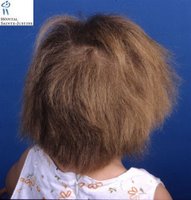Cheveux Incoiffables
 "Uncombable hair syndrome was first described some 3 decades ago as "cheveux incoiffables" and is also known as spun-glass hair and pili trianguli et canaliculi. Both inherited (autosomal dominant and recessive with variable levels of penetrance) and sporadic forms of uncombable hair syndrome have been described, both being characterized by scalp hair that is impossible to comb due to the haphazard arrangement of the hair bundles."
"Uncombable hair syndrome was first described some 3 decades ago as "cheveux incoiffables" and is also known as spun-glass hair and pili trianguli et canaliculi. Both inherited (autosomal dominant and recessive with variable levels of penetrance) and sporadic forms of uncombable hair syndrome have been described, both being characterized by scalp hair that is impossible to comb due to the haphazard arrangement of the hair bundles."[snip]
"Most individuals are affected early in childhood and the hair takes on a spun-glass appearance with the hair becoming dry, curly, glossy, lighter in color, and progressively uncombable. Only the scalp hair is affected."
[snip]
"In most cases of uncombable hair syndrome, the hair is grossly abnormal in infancy and early childhood, but may have improved manageability later in life. Scanning electron microscopy of hair samples provides definitive evidence for diagnosis of clinically suspected uncombable hair syndrome and eliminates other hair abnormalities from the differential diagnosis."
From PubMed, a service of National Library of Medicine and the National Institutes of Health.

Comments on "Cheveux Incoiffables"
-
 AbbaGav said ... (5:51 AM) :
AbbaGav said ... (5:51 AM) :
-
 Gentleman Farmer said ... (10:52 AM) :
Gentleman Farmer said ... (10:52 AM) :
-
 Selfish Country Music Loving Lady said ... (10:30 PM) :
Selfish Country Music Loving Lady said ... (10:30 PM) :
post a commentWas there anything about unbrushable teeth? We're having a big problem with that. Also undoable homework.
Let's hope for a miracle cure.
You missed un-tieable shoes, and un-foldable clothes. But I'm familiar with the syndromes you cite.
Aw, don't blame Pubmed, which just indexes all peer-reviewed abstracts. Blame the made-up-sounding journal "Ultrastructural Pathology."